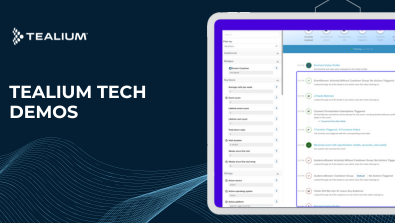Data has become a powerful force over the past decade, and organizations that empower their workers with the right tools for analysis gain a critical competitive advantage. This article highlights four key trends in data. As we prepare to close out this year and look ahead to the next, let’s explore trends discussed by data leaders. Let’s get into it!
Four Trends In Data
Increasing Importance of Data in Artificial Intelligence (AI) Applications
AI will only become increasingly more important in the coming years. Last year, many businesses were dabbling with AI usage, but this year we expect that businesses will heavily invest in implementing AI on a much larger scale. When it comes to creating the best AI outputs, you’ll want to use the best data to train your models.
When it comes to data for AI, here are some key data considerations for AI success:
- Consent: Data used for AI must be consented to ensure compliance with data privacy regulations. For more information on those regulations, see our blog.
- Filtered: Only relevant data should be used to train AI models. This helps avoid unnecessary costs and improves output accuracy.
- Enriched: Adding context to data, such as customer demographics or past behavior, can enhance AI models and personalization efforts.
- Real-Time: Real-time data pipelines are crucial for delivering personalized experiences and responding to customer needs at the moment.
Customer Trust Built Through Data Control and Transparency
Let’s face it – customer trust is hard to gain. Once you lose a customer’s trust, it’s not only hard to regain it but incredibly expensive to do so. Next year, we predict that the role of data trust in successful digital strategies will not just be a “check the box” mindset. Instead, it will be baked into the very foundation of businesses. We find that customer trust is built upon control, transparency, and responsible data governance.
Control over data is paramount. Our conversations with data leaders reveal that companies are investing heavily in their first-party data foundation, giving them more control over customer data. Our 2024 State of The CDP report found that 65% of Customer Data Platform (CDP) users are increasing their spending on first-party data strategies. Here at Tealium, we champion a flexible, open data layer that allows businesses to maintain control over their data and activate it across various platforms.
In addition to data control, we predict an increase in data transparency efforts. Companies need to be upfront about how they collect, use, and protect customer data.
How To Increase Customer Trust With Data
- Clear communication with customers about data practices, including providing granular consent and preference options to support customer trust and relationships.
- Offering customers control over their data, including multi-toggle opt-out options, helping them to better manage their preferences.
- Using zero-party data tools like (Tealium Moments iQ) help use customer choices as zero-party data inputs. Using these zero-party data selections ensures that customers feel heard and establishes a clear value exchange for more meaningful interactions.
Embracing A Customer-Centric Mindset
Competition has never been greater across all businesses and industries, and those who deliver superior Customer Experience (CX) will continue to rise. In our webinar with Rusty Warner (VP and Principal Analyst at Forrester), he places importance on making the customer experience the heart of every department across the business. CDPs play a pivotal role in enhancing customer-centric strategies, by enabling better customer relationships across the entire organization.
Personalization at Scale
When it comes to a customer-centric mindset, a key component is personalization at scale. This involves tailoring experiences to each individual customer. Achieving this requires:
- A Robust Data Foundation: This includes collecting and unifying data from various sources (online and offline) to create a comprehensive customer view. The emphasis is on first-party data, which is considered a valuable strategic asset due to its accuracy and control, especially in the face of third-party cookie deprecation.
- Data Enrichment: Enriching data by adding contextual information (like demographics, past interactions, and preferences) is crucial to enabling AI to understand and predict customer behavior.
- Real-Time Activation: The ability to act on insights in real-time is paramount. Delayed analysis can lead to missed opportunities, whereas real-time systems allow for immediate response to customer actions, delivering personalized experiences in the moment.
By leveraging Tealium’s real-time capabilities, businesses can move beyond the limitations of batch processing and create a truly dynamic and responsive customer experience.
Data Governance in a Customer-Centric World
Data governance and strategies around it will continue to trend in the next few years. Robust data governance is essential for ensuring data quality, compliance, and ethical data use, forming the bedrock of trust upon which successful customer-centric strategies are built.
Data Governance as a Foundation for Trust
- Compliance with Regulations: Companies must implement robust data governance practices to ensure compliance and maintain customer trust. Failure to do so can result in significant financial penalties and reputational damage.
- Respect for Customer Privacy: Effective data governance encompasses respecting customer privacy by obtaining clear and informed consent for data usage, offering granular control over data sharing preferences, and implementing data access and deletion request mechanisms.
- Data Security: Protecting sensitive customer information from unauthorized access, breaches, and misuse is crucial for maintaining trust and meeting regulatory requirements.
Data Governance Enables Effective AI and Customer Experiences
- Data Quality for AI: AI is only as effective as the quality of the data it is trained on. Data governance practices, including data validation, cleansing, and standardization, ensure the accuracy, consistency, and reliability of data used to fuel AI models, leading to more effective outcomes.
- Traceability and Explainability: Data governance fosters traceability and explainability, enabling companies to understand the origin, flow, and usage of their data. This is particularly important in the context of AI, where decisions made by algorithms need to be transparent and accountable.
- Ethical Data Use: Strong data governance frameworks promote ethical data use by defining clear guidelines and policies for data collection, storage, processing, and sharing. This ensures that data is used responsibly and ethically, aligning with customer expectations and values.








